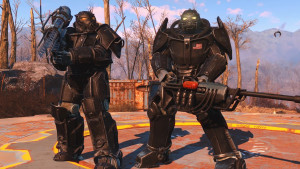Please support Game Informer. Print magazine subscriptions are less than $2 per issue
Opinion – Separating A Game From Its Name

I was playing The Legend of Zelda: Breath of the Wild, and despite enjoying my time with it, a lot of little things bothered me. Your weapons break too quickly. Your horse can’t fast-travel with you. Your stamina depletes too quickly when sprinting. These are issues that open-world RPGs solved years ago, and the fact that Breath of the Wild received universal praise despite such basic problems was baffling to me. I thought, “If this game weren’t called The Legend of Zelda, people would never be so forgiving.”
I hear that sentiment often when discussing games. I have even said it myself. You’ve probably said similar things when playing an entry in a series with a devoted following, like Final Fantasy or Call of Duty. You feel like you are the only person who sees through an illusion, and that fans are blind to failings that seem crystal clear. But even if you think an “If this game weren’t called…” observation is true, that doesn’t make it significant.

These arguments rely on the assumption that games are composed of two distinct parts: objective mechanical elements that represent the true experience, and subjective smoke and mirrors that distort players’ perceptions. From that flawed foundation grows the mistaken notion that we can experience the purest version of a game if we strip away the “extraneous” trappings – that we can (and should) try to look beyond the franchise and see a game only for the naked systems underneath.
The problem? Gaming doesn’t work that way. We don’t experience games as neat, compartmentalized components; all of the elements work in concert to produce the whole. As we play, we also take in the atmosphere, interpret themes, and get attached to characters.
Those things happen in parallel, building off each other, and they are precisely what establish a franchise’s identity over time. That’s why when gamers accuse each other of being blinded by fandom, they aren’t talking about a simple name. They are talking about everything that name entails.
When you’re talking about a painting – Van Gogh’s “Starry Night,” for example – you wouldn’t say, “If this painting didn’t have so much blue, it wouldn’t be anything special.” The blue helps make it special. The same rule applies to games. Could you attempt to remove the things that make a specific franchise unique? Sure, but then it becomes something different – the idea of a game distilled to its bare structure, one of many titles we ignore on shelves and digital storefronts because they have no personality.

What developers wrap around a game’s basic mechanics is important. Consider two open-world titles from the last generation, Grand Theft Auto IV and Saints Row: The Third. The former is famous for being a sharp-but-satirical look at the real world and its struggles, while the latter takes an anything-goes approach to a bonkers story. If you strip all that away and look at the basic framework, players are largely doing similar things in both cases. You’re driving vehicles, shooting bad guys, picking up missions, and exploring large cities. Grand Theft Auto and Saints Row obviously aren’t identical on the gameplay front, but my point is this: The writing, tone, characters, and aesthetics of these series color the installments and attract different players for different reasons. If you removed that layer and compared the games, you might still come to the conclusion that GTA is a superior experience, but that decision wouldn’t be informed by the things that make either series notable. Gaming isn’t supposed to be like the blind taste tests of the cola wars; you can’t just cover up a label, take a sip, and point to the best one.
This brings us back to talking about Zel da. You can’t separate Breath of the Wild from Zelda, and even if you could, it isn’t a better or truer form of the game. Despite the little things that irk me about it, Breath of the Wild also harnesses fans’ love of the series in significant ways. It plays off expectations and subverts traditions to create delightful moments, and those moments can have an even greater impact on players’ overall enjoyment than a few annoying design flaws. I would rather have that than the alternative – developers striving to create abstract, platonic ideals of game concepts that deliver the same thing to all players regardless of context or experience. After all, that context and experience can be the critical difference between a good game and a great one.
[This article originally appeared in Game Informer #291]










